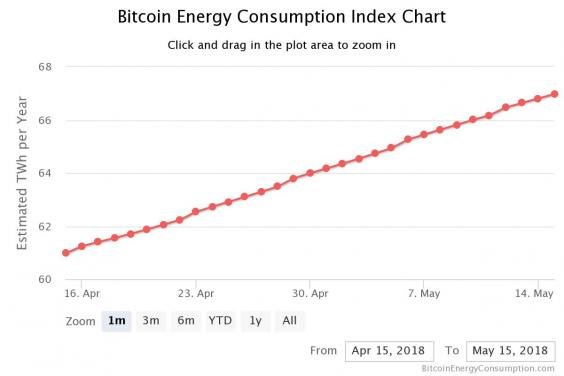Bitcoin will use 0.5% of world’s electricity by end of 2018, finds study
The bitcoin network currently uses as much electricity as Ireland and is set to consume 0.5 per cent of all the world’s electric energy by the end of this year, according to new calculations.
Economist Alex de Vries, whose Digiconomist blog hosts the Bitcoin Energy Consumption Index, quantified bitcoin’s energy requirements in a paper published in the scientific journal Joule on 16 May.
The electricity demands comes from the computing power required to mine bitcoin – the process of generating new units of the cryptocurrency by solving complex mathematical puzzles. These puzzles are designed to get more complicated as bitcoin’s network grows, thus requiring even greater computing power.
It is the first time estimates of bitcoin’s energy demands have been peer-reviewed and adds considerable weight to the debate of how to address the environmental impact of the world’s most valuable cryptocurrency.
“We’ve seen a lot of back-of-the-envelope calculations, but we need more scientific discussion on where this network is headed,” Mr de Vries said.
“Half a per cent is already quite shocking. It’s an extreme difference compared to the regular financial system, and this increasing electricity demand is definitely not going to help us reach our climate goals.”

The amount of energy required to support the bitcoin network has grown to 'epic proportions', according to Digiconomist founder Alex de Vries (Digiconomist)
Previous calculations by Mr de Vries have been used to predict how long it would take for bitcoin’s energy consumption to be unsustainable.
At one point during bitcoin’s rapid rise in late 2017, if the network’s growth had continued it would have required all of the world’s current energy production in order to support itself by 2020.
Various factors mean that this would never actually occur, however Mr de Vries warns that the network could someday consume 5 per cent of the world’s electricity.
You do not have access to view this Atom.
To limit the impact of such energy consumption, some states in the US have put restrictions in place around bitcoin mining. Mr de Vries hopes his paper will be used to better inform policy in this area.
“I think everyone agrees on the minimum energy consumption. But the future estimate? That’s quite debatable,” he said.
“I am hoping to get this conversation started. I’m doing this research, but a lot of people should be doing it.
The Independent's bitcoin group on Facebook is the best place to follow the latest discussions and developments in cryptocurrency. Join here for the latest on how people are making money – and how they're losing it.
I don't like the high energy consumption, or the hardware that can only be used for mining and then becomes obsolete. It makes mining more profitable in countries that have low energy costs, that doesn't seem right.
Absolutely